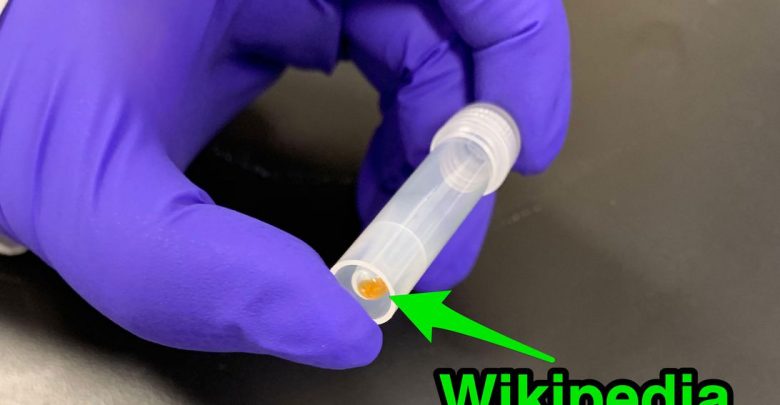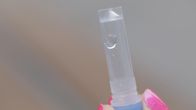Electronics
Startup packs all 16GB of Wikipedia onto DNA strands to exhibit new storage tech – CNET

Startup Catalog has saved all 16GB of English-language Wikipedia on DNA contained on this vial.
Catalog
Pc storage expertise has moved from wires with magnets to laborious disks to 3D stacks of reminiscence chips. However the subsequent storage expertise would possibly use an method as outdated as life on earth: DNA. Startup Catalog introduced Friday it is crammed all the textual content of Wikipedia’s English-language model onto the identical genetic molecules our personal our bodies use.
It achieved the feat with its first DNA author, a machine that will match simply in your own home in case you first removed your fridge, oven and a few counter area. And though it is not more likely to push apart your cellphone’s flash reminiscence chips anytime quickly, the corporate believes it is helpful already to some clients who must archive knowledge.
DNA strands are tiny and tough to handle, however the organic molecules can retailer different knowledge than the genes that govern how a cell turns into a pea plant or chimpanzee. Catalog makes use of prefabricated artificial DNA strands which can be shorter than human DNA, however makes use of much more of them so it could actually retailer way more knowledge.
Counting on DNA as a substitute of the most recent high-tech miniaturization would possibly sound like a step backward. However DNA is compact, chemically steady — and given that it is the basis of the Earth’s biology, it is arguably not as more likely to develop into as out of date because the spinning magnetized platters of laborious drives or CDs which can be disappearing at present the best way floppy drives already vanished.
Who’s out there for this type of storage? Catalog has one associate to announce, the Arch Mission Basis that is attempting to retailer human data not simply on Earth however even elsewhere within the photo voltaic system — like on Elon Musk’s Tesla Roadster that SpaceX launched into orbit. Past that, Catalog is not able to say who different clients is likely to be or if it will cost for its DNA writing service.
Catalog’s DNA writing machine can write knowledge at a price of four megabits per second, however the firm hopes to make it at the very least a thousand instances sooner.
Catalog
“We’ve discussions underway with authorities businesses, main worldwide science tasks that generate enormous quantities of check knowledge, main corporations in oil and gasoline, media and leisure, finance, and different industries,” the corporate mentioned in a press release.
Catalog, primarily based in Boston, has its personal machine to write down knowledge that may file four megabits per second proper in DNA. Optimizations ought to triple that price, letting folks file 125 gigabytes in a single day — about as a lot as a higher-end cellphone can retailer.
Standard DNA sequencing merchandise already on the market within the biotechnology market learn the DNA knowledge. “We expect this complete new use case for sequencing expertise will assist [drive] down value fairly a bit,” Catalog mentioned, arguing that computing enterprise is a probably a lot bigger market.
Two MIT graduate college students, Chief Government Hyunjun Park and Chief Know-how Innovation Officer Nathaniel Roquet, based Catalog in 2016.
Catalog makes use of an addressing system meaning clients can use massive knowledge units. And although DNA shops knowledge in lengthy sequences, Catalog can learn data saved wherever utilizing molecular probes. In different phrases, it is a type of random-access reminiscence like a tough drive, not sequential entry just like the spools of magnetic tape you would possibly keep in mind from the heyday of mainframe computer systems a half century in the past.
Though DNA knowledge might be disrupted by cosmic rays, Catalog argues that it is a extra steady medium than the options. In any case, we have DNA from animals that went extinct hundreds of years in the past. How a lot do you wish to wager that USB thumb drive in your desk drawer will probably be nonetheless helpful even 25 years from now?

Watch this:
DNA knowledge storage might remedy a giant drawback
7:06

